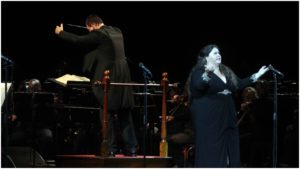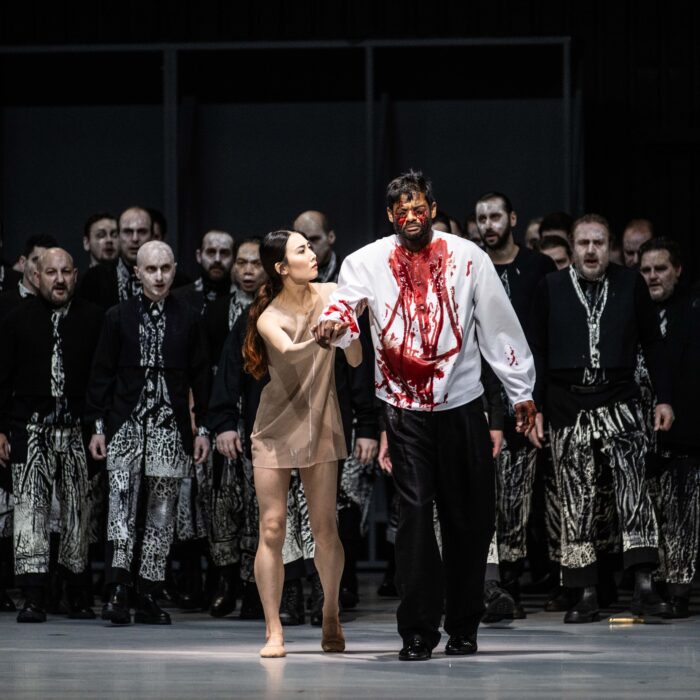
Teatro Massimo di Palermo 2021 Review: Il Trovatore
Angela Meade & Violeta Urmana Offset A Lackluster Orchestral Performance
By Alan Neilson(Photo: Franco Lannino)
For its summer season Palermo’s Teatro Massimo moves outdoors to the Teatro di Verdura, situated in parkland on the outskirts of the city centre. The cool evening heat, with a gentle breeze blowing in from the sea, along with the theatre’s sizable stage and substantial amount of raked seating with excellent sight lines suggested everything was just perfect for the company’s concert performance of “Il Trovatore.”
At least, it did so, until it became apparent that there were microphones positioned on the stage for the soloists.
An Amplified Performance
The question has to be, why? Why was the performance to be miked? It was a quality cast, obviously used to singing in big theaters and arenas, and the theatre, although big, was not unusually so. The justification for their use was certainly not obvious!
If singers appear a little quieter in an outdoor venue, it is certainly compensated for by the sound of their voices being carried on the night air; it is a wonderful experience, and one of the pleasures of attending outdoor summer performances. Moreover, miking a performance brings an unpleasant artificial quality into the proceedings, either in reality or in the mind. When listening to a normal performance, the audience can be enthralled by a soprano, whose voice rings out above the combined forces of the chorus and orchestra. However, when she is miked the question lingers in the back of the mind, was that really her or was it simply an amplification of her voice? Taken to its logical conclusion, one could ask why train singers to project their voices at all, why not mike them instead? But the answer is obvious, the audience wants to be in awe of the performer, to see them accomplish a feat which is extraordinary.
If one is sitting to the right or left of the stage, then you have the added displeasure of having speakers directly in front of you, and despite the quality of modern day sound systems, having the voice emanating from a different source than its origin can be disconcerting. Watching a singer mouthing words on the extreme left of the stage, while their disembodied voice is transmitted from a speaker in front of you on the right, is off-putting to say the least.
Then there is the question of musical balance, and this was a serious problem for this performance. The soloists, as expected, were situated along the front of the stage, with the conductor Daniel Oren and the Orchestra del Teatro Massimo stationed a significant distance behind them, and the chorus arranged along the back of the stage.
Oren produced a subdued, albeit detailed, performance in which he appeared too attentive to the needs of the soloists, so that on occasions the singers would overwhelm the orchestra, the music forming little more than an barely audible undercurrent. Or was it just that there was a disconnection between the sound reaching the audience via the speakers and sound of the soloists as heard by Oren? Either way, it made for a musically unbalanced presentation.
Two Fine Female Leads
In the role of Leonora was the American soprano Angela Meade, whose formidable voice is certainly in no need of amplification, as she demonstrated by singing as she walked onto the stage, clearly audible even though she was not in range of the microphone. She has a voice ideally suited to the demands of Verdi’s heroine: a strong, secure and bright upper register, flexibility across the range, excellent phrasing, and a dazzling coloratura. Each aria was confidently dispatched. In “Tacea la notte placida” she displayed her ability to fill out the vocal line and push the voice upwards with ease, while in the cabaletta “Di talor amor” her voiced danced lightly along the line, and took coloraturas in her stride. Her rendition of “D’Amor sull’ali rosee” was precise and detailed. The ensemble pieces allowed her to shine, her voice clashing and blending intelligently with the other soloists, invariably finishing by striding out above the chorus, orchestra and other singers.
Yet for all her vocal quality, Meade did not fully convince; her characterization of Leonora, both vocally and through her gestures, was fairly superficial and detracted from the overall impact of her performance.
Violeta Urmana’s performance, on the other hand, in the role of Azucena was founded upon her exemplary ability to characterize a role. Although Urmana is in the twilight of her career she is still able to dominate the stage, and deal comfortably with the vocal demands of her character, notwithstanding the nagging questions about the role played by amplification which continued to linger. For her opening aria “Stride la vampa!” she produced an energetic performance, in which her phrasing was beautifully crafted to paint a picture of the dark forces swirling around her vision, in which she infused her voice with a rich array of subtle, rather than flat bold, colors.
In the extended passage with Manrico which includes the duet “Mal reggendo all’aspro assalto,” Urmana produced a wonderfully expressive presentation, full of dynamic, emotional and anxious inflections, which brilliantly captured Azucena’s fiery character. In all the ensembles she successfully displayed a higher level of identification with her character than the other soloists.
Baritone Artur Rucinski started off a little tentatively, but was soon into his stride and produced a fine performance as Conte di Luna. He has an appealing middle register, capable of seducing the listener, although occasionally sounded a little under pressure in the upper register.
His aria “Il balen del suo sorriso” was was given a strong rendition; singing comfortably, his sweet lyricism captured Luna’s deep feelings as he poured out his heart, for which he received loud applause from the audience. Rucinski was also effective in the ensemble pieces, his voice proving to be an excellent counterpart to the other soloists.
Carlo Ventre has a pleasing vocal timbre, is strong across the range with a firm, clear upper register. However, his essaying of Manrico did not have the impact one might have expected. Although he gave solid performance, he failed to fully convince. His singing came over as too mannered, which was amplified by his use of stock gestures. Nevertheless, his vocal beauty cannot be denied, and one came away with the impression that he did not take full advantage of the role.
Ferrando was played by Sava Vemic. He possesses a well-supported, clear toned bass which he used well to characterize the part. In the opening scene he successfully captured the horror of the events which led to the present situation. His crafting of recitatives was secure and the aria “Abbietta zingara, fosca vegliarda” displayed agility.
Of the minor roles soprano Carlotta Vichi as Leonora’s confidante Ines gave the most convincing performance, sympathetically complementing Meade’s soprano.
Choral Excellence
The Coro del Teatro Massimo under Maestro di Coro Ciro Visco was unambiguously excellent. Each chorus, including small interjections, were brought thrillingly alive. Always sensitive to the dramatic situation, it molded its presentation accordingly, with careful emphases of dynamic shifts, attention to vocal coloring, and the clear highlighting of emotion states. The balance between voice types was also neatly managed. The famous anvil chorus “Vedi! le fosche notturne spoglie” was attacked with real gusto, and maintained an exhilarating hold on the audience’s attention. Even the orchestra could not fail to respond, and awoke from its slumber, to provide a vigorous accompaniment.
Overall, this was a performance which failed to ignite, despite some excellent contributions, most notably from Urmana, Meade and the chorus. The orchestra, under Oren, whether compromised by the sound system or otherwise, simply did not inject sufficient energy into the concert.



